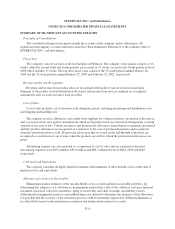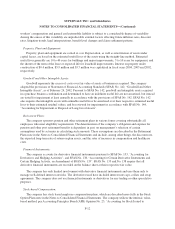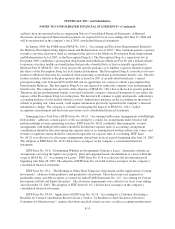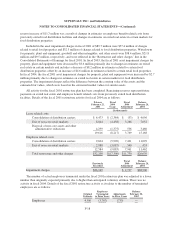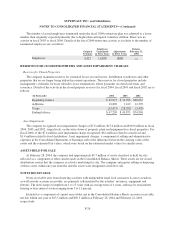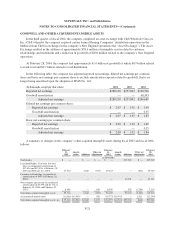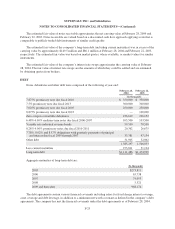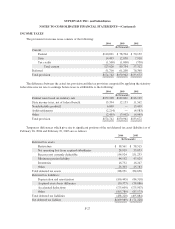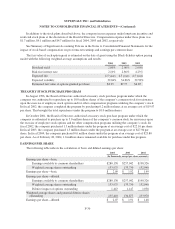Albertsons 2004 Annual Report Download - page 67
Download and view the complete annual report
Please find page 67 of the 2004 Albertsons annual report below. You can navigate through the pages in the report by either clicking on the pages listed below, or by using the keyword search tool below to find specific information within the annual report.
SUPERVALU INC. and Subsidiaries
NOTES TO CONSOLIDATED FINANCIAL STATEMENTS—(Continued)
The number of actual employees terminated under the fiscal 2000 restructure plan was adjusted to a lower
number than originally expected primarily due to higher than anticipated voluntary attrition. There was no
activity in fiscal 2003 or fiscal 2004. Details of the fiscal 2000 restructure activity as it relates to the number of
terminated employees are as follows:
Original
Estimate
Employees
Terminated
in Prior Years
Adjustments
in Prior Years
Balance
February 23,
2002
Employees 2,517 (1,693) (824) —
RESERVES FOR CLOSED PROPERTIES AND ASSET IMPAIRMENT CHARGES
Reserves for Closed Properties
The company maintains reserves for estimated losses on retail stores, distribution warehouses and other
properties that are no longer being utilized in current operations. The reserves for closed properties include
management’s estimates for lease subsidies, lease terminations, future payments on exited real estate and
severance. Details of the activity in the closed property reserves for fiscal 2004, fiscal 2003 and fiscal 2002 are as
follows:
(In thousands) 2004 2003 2002
Beginning balance $ 49,873 $ 74,996 $68,067
Additions 10,809 3,169 12,399
Usage (13,477) (28,292) (5,470)
Ending balance $ 47,205 $ 49,873 $74,996
Asset Impairment
The company recognized asset impairment charges of $7.6 million, $15.6 million and $10.0 million in fiscal
2004, 2003 and 2002, respectively, on the write-down of property, plant and equipment for closed properties. For
fiscal 2004, of the $7.6 million asset impairment charge recognized, $6.2 million related to retail food and
$1.4 million related to food distribution. Asset impairment charges, a component of selling and administrative
expenses in the Consolidated Statements of Earnings, reflect the difference between the carrying value of the
assets and the estimated fair values, which were based on the estimated market values for similar assets.
ASSETS HELD FOR SALE
At February 28, 2004, the company had approximately $9.7 million of assets classified as held for sale
reflected as a component of other current assets in the Consolidated Balance Sheets. These assets are for closed
distribution centers that the company is actively marketing for sale. The company anticipates selling or disposing
of these assets within one year from the date the assets were designated as held for sale.
NOTES RECEIVABLE
Notes receivable arise from financing activities with independent retail food customers. Loans to retailers,
as well as trade accounts receivable, are primarily collateralized by the retailers’ inventory, equipment and
fixtures. The notes range in length from 1 to 15 years with an average term of 6 years, and may be non-interest
bearing or bear interest at rates ranging from 5 to 11 percent.
Included as a component of current receivables, net in the Consolidated Balance Sheets are notes receivable,
net due within one year of $25.5 million and $30.3 million at February 28, 2004 and February 22, 2003,
respectively.
F-20


